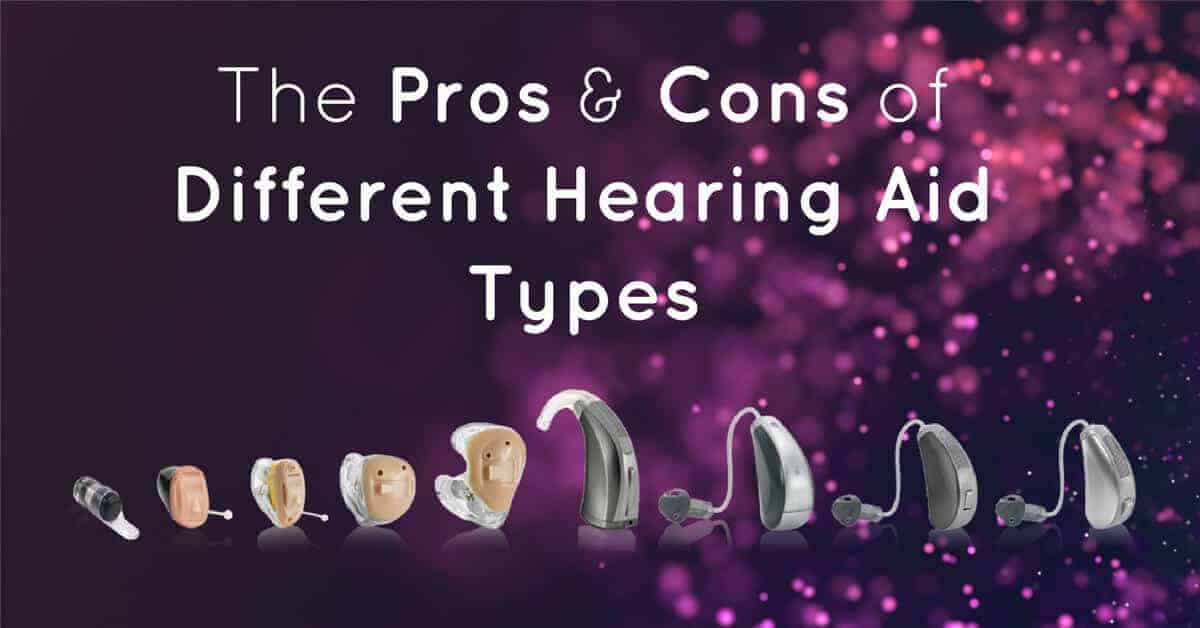When you’re in the process of choosing the right hearing aid, the options can seem pretty overwhelming. That’s because hearing aid design truly offers something for everyone. Before you choose a hearing aid it’s important to understand the advantages and drawbacks of the different styles available. The degree of your hearing loss and your lifestyle needs will shape what styles of hearing aids are going to work the best for your hearing treatment, so take a little time to get familiar with what each style can offer you.
Behind the Ear (BTE)
Behind the Ear hearing aids consist of a hard plastic shell that rests behind your ear and a plastic tube that connects to an ear mold fitted to your ear canal. BTE models are some of the largest hearing aids available. This makes them more noticeable than other styles, but also easier to manipulate. Additionally, Behind the Ear hearing aids are tend to be among the most durable hearing devices on the market. If you are challenged with profound hearing loss, BTE hearing aids are capable of delivering the most powerful amplification and may be your best style option.
Mini Behind the Ear (Mini BTE)
Alongside Behind the Ear models, Mini BTE hearing aids have a different approach to delivering sound to your ear. The microphone and amplifier of the hearing device is still contained in a compact shell that rests behind your ear. Sound is delivered to your ear through a small ear bud, rather than a molded form that fills the canal. The ear bud leaves some of the ear canal open and can give a more “natural” sense to assisted hearing.
Receiver In Canal (RIC)
Receiver In Canal hearing aids place a discreet shell tucked behind your ear, with wires connecting to a small ear bud or ear mold with a receiver that delivers sound to the ear canal. RIC hearing devices are smaller than BTE type hearing aids and therefore, less noticeable. Receiver In Canal hearing aids can deliver powerful hearing assistance and some of the best overall sound quality of all the styles. RIC models are often on the cutting edge of technology advancements and smart device compatibility.
In the Ear (ITE)
Hearing aids that are In the Ear consist of a molded plastic shell that rests in the outer ear and holds all components of the hearing aid. In the Ear models are easy to use and care for. They are well suited for telephone conversations and can make use of directional microphones. However, because they are worn in the outer ear they are among the most noticeable styles of hearing aid.
In the Canal (ITC)
In the Canal hearing aids are molded to fit tucked into the opening of the ear canal. These devices are very small, yet they are still able to accommodate features like directional microphones into their functionality. Their size and location in the ear makes them a very discreet option, but can also make them harder to place or manipulate for people with dexterity issues. ITC models delver great sound directly into the ear canal but can also experience sound feedback.
Completely In Canal (CIC)
If invisibility is a priority, a Completely In Canal hearing aid may be your top choice. The hearing aid is molded to your ear and placed entirely inside your ear canal. CIC hearing aids are lightweight but they also don’t have the performance capabilities of larger models. To use Completely In Canal hearing aids requires good dexterity – the small devices have even smaller batteries, and the hearing aids can be hard to place if you have coordination challenges. Like ITC and ITE hearing aids, CIC styles are easy to use with a telephone. They make use of your natural ear shape to create directional hearing.
Invisible In Canal (IIC)
Similar to CIC models, Invisible In Canal hearing aids are placed even deeper into the ear canal. IIC models are the most discreet of all hearing aid options but their capabilities don’t make them available for all levels of hearing loss. Additionally, they require coordination to place correctly and change batteries. IIC models deliver clear sound without the risk of feedback, and for some people feel the most natural of the hearing aid designs.
Hearing Wellness Solutions
If you are currently looking for hearing aids, let Hearing Wellness Solutions help you discover new solutions. We carry a full selection of hearing aids from top brands, with plenty of options to choose from. Our hearing specialists can help match you with the best hearing options for your lifestyle as well as custom fit your hearing aids and program them to optimize your hearing experience. Reach out to us today, for specialized hearing care you can trust.


